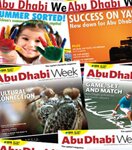 Dates and palm trees have long been considered symbolic in the capital. As the fifth Mazayin Al Ratab Festival opens in Liwa on 16th July for ten days of celebration and education, Abu Dhabi Week delves into the history and significance of the palm date
Dates and palm trees have long been considered symbolic in the capital. As the fifth Mazayin Al Ratab Festival opens in Liwa on 16th July for ten days of celebration and education, Abu Dhabi Week delves into the history and significance of the palm date
The organising committee of the Mazayin Al Ratab Festival (Ratab is the name given to dates that are just ripe) has been working hard to make sure that this year’s event is even bigger and better than ever.
The event is a combination of agricultural fair, cultural celebration and visitor attraction; activities will include dates contests, traditional handicrafts competitions, poetry, popular games, question and answer sessions, a special session to educate children on how to care for palm trees, and auctions for dates.
This year’s Festival offers plenty of competitions for keen farmers to show off their prized crops. Dates will be split into categories and judged by a panel of experts on the taste, appearance and even the farmland on which the dates were produced.
In part the aim is to encourage the development of date farms throughout the UAE, in terms of both number and quality. Equally important is the sense of tradition and national pride – Sheikh Zayed Bin Sultan Al Nahyan, founder of the UAE, planted millions of date palms all over the country
and stressed the importance of agriculture to provide food security and social stability. The Liwa Date Festival is also commemorating the centenary of Sheikh Zayed the Great. Says Obaid Khalfan Al Mazrouei, director of the Festival: “Sheikh Zayed the Great is a beacon to future generations. He was a man with charisma, a leading figure of his time, and a distinguished ruler and leader with an edge among his compatriots.”
The UAE has a Guinness World Record for the most palm trees planted in 10 years – a total of 42 million.
But before world records and festivities, the simple date held just as important a place in the Arab region, as well as across many other parts of the world. Here’s our overview of what is arguably the region’s most important fruit.
Food for thought
Dates have been a staple food of the Middle East for thousands of years. Believed to have originated around the Persian Gulf, the fruit has been cultivated since ancient times there is archaeological evidence of date cultivation in eastern Arabia in 6000 BC. Arabs probably spread date cultivation throughout South and South East Asia, northern Africa, and Spain and Italy.
Dates are commonly used in a range of Arabic sweet and savoury dishes, from tagines in Morocco to puddings such as ka’ak (an Arab biscuit). Today, popular adaptations include chocolate-covered dates and sparkling date juice, used in some Islamic countries as a nonalcoholic version of champagne for special occasions and religious times such as Ramadan. Dates and yogurt or milk are a traditional first meal when the sun sets during Ramadan.
Dates can also be dehydrated, ground and mixed with grain to form a stock feed. Dried dates, ground or unground, are often fed to camels, horses and dogs in the desert; date seeds can also be ground and used in drinks as an alternative to or additive for coffee.
Young date leaves can be cooked and eaten as a vegetable, and so can the terminal bud or palm heart (though its removal will kill the palm). The flowers of the date palm are also edible – the flower buds are used in salads or ground with dried fish to make a spread or condiment for bread.
In North Africa the sweet sap obtained from tapping palm trees is known as l?gb?. If left for a sufficient period of time (typically hours, depending on the temperature) l?gb? easily becomes an alcoholic drink.
On the other hand, there’s a traditional belief that dates themselves can counteract alcohol intoxication. In northern Nigeria, dates and peppers are added to the native beer to make it less alcoholic.
Festive occasion
The Festival’s total area is approximately 43,000 sq m, including the hospitality tent and another specifically for children. There are also 140 shops in the market area, mostly run by producer families.
“There are several surprises for children and families visiting the festival,” said Festival director Khalfan Mazrouei, though he added that they will be announced “in the right time in order not to spoil the element of surprise”.
Daily shuttle buses will run between Abu Dhabi and Liwa throughout the event days.
The Festival runs between 16th and 27th July under the patronage of HH Sheikh Mansour bin Zayed Al Nahyan, Deputy Prime Minister and Minister of Presidential Affairs. It is organised by the Abu Dhabi Authority for Culture and Heritage (ADACH) – for more information go to www.adach.ae
Marvellous in medicine
Dates have a high tannin content and can be used medicinally as a detersive (a cleansing agent) for intestinal troubles. As an infusion, syrup, or paste, dates can be taken for sore throat, colds and coughs.
Building benefits
Where craft traditions still thrive, notably in Oman, the palm tree is the most versatile of all indigenous plants and virtually every part of the tree is utilised to make everyday items ranging from rope and baskets to beehives, fishing boats and traditional dwellings – there need be little waste with the date palm.
Date palm wood is used for posts, rafters, bridges and parts of dhows. In North Africa in particular, palm leaves are commonly used for making huts. Mature leaves can be made into mats, screens, baskets and fans; processed leaves can be used for insulating board. Leaf sheaths are prized for their scent, and fibre from them is also used for rope, coarse cloth, and large hats. Dried leaf talks are a source of cellulose pulp but can also make brooms, fishing floats and fuel.
[Originally published in Abu Dhabi Week vol 2 issue 25]





